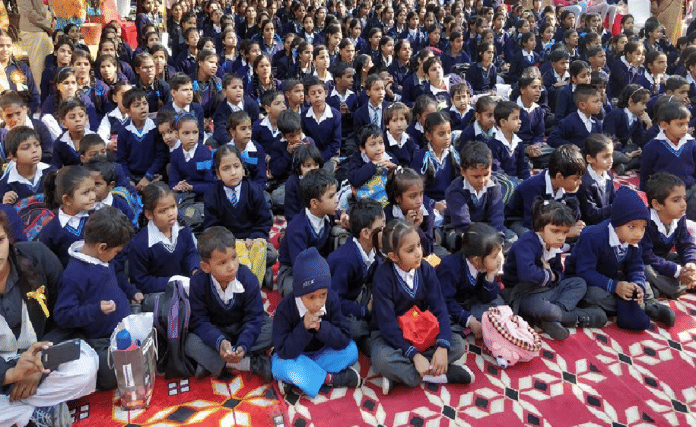The Delhi government is not installing CCTVs in perfectly functional schools. They are being put in a school system that has suffered criminal neglect for several years.
The installation of CCTV cameras in Delhi government school classrooms aims to serve two purposes: to enhance security of children, and to increase accountability of teachers to the parents of children.
The decision to install cameras in classrooms was not reactionary or knee-jerk. In fact, Chief Minister Arvind Kejriwal announced it only after a successful pilot program in some government schools. But the reactions of some people have indeed been knee-jerk and half-baked.
While the response of parents has been overwhelmingly enthusiastic, some concerns have been raised by a range of people, including journalists and lawyers. As someone who has worked with the Delhi government on education policy over the last two years, I will attempt to contextualize this decision.
(Also read: Did Kejriwal do nothing naughty in school that he would’ve liked to hide from CCTV cameras?)
The incidents of violence against children in Delhi NCR have shaken the faith of parents in the ability of schools to ensure the safety of their children. In the immediate aftermath of these incidents, the Delhi government had convened a meeting between representatives of private schools, the education department, the MCD (which runs 1700 primary schools), and the Delhi police.
Several directions were issued to schools, after a comprehensive overhaul of school safety mechanisms was proposed by Education Minister Manish Sisodia. When children are on the premises of government schools, their security is the responsibility of the Delhi government. Installing CCTV cameras in all classrooms, in addition to the existing cameras in the school building, is the logical next step for a government that wants to leave no stone unturned in creating a safe environment.
Schools are public spaces, and there is a trade-off between XXX and the larger goal of security. One cannot claim that there is a reasonable expectation of privacy in a classroom full of at least 40 children and a teacher.
The distinctive feature of this particular proposal is that access to the feed will be shared with parents in real time. Parents are important stakeholders in schools. They are part of Right to Education Act-mandated School Management Committees (SMCs) in government schools, which empowers them to visit and supervise the functioning of the schools.
The world over, parents play an active role in keeping schools accountable to the community they serve. A top-down approach towards accountability cannot work when there are over 1000 schools to administer. There is no centralised police control room to monitor the feeds at the school or department. Parents can help fill this gap by being vigilant.
Not only will this deter heinous crime, it will also deter corporal punishment and bullying, as the pilot demonstrated. One child even said that his stationery no longer gets stolen! Parents keep track of attendance of their children, as well as teachers.
In July 2016, the education department in Delhi found in its baseline assessment that 74 per cent of children in Class 6 (the entry level class in a majority of Delhi government schools) were unable to read their grade-level textbooks. It is an inconvenient truth that a large majority of the children enrolled in government schools, in Delhi and in the country, are doomed to fail.
Many interventions have been initiated to improve the quality of teaching, learning methodologies employed inside classrooms, and developing school leadership of principals. Installation of CCTV cameras will not come in the way of the improving teaching quality, as is being suggested by some.
In Delhi government schools, not unlike public schools around the country, thousands of children enrolled in school do not actually turn up. They become, what the system calls, ‘long absentees’. Their parents have no way of knowing if their children are attending school. The real time feeds to parents will help.
A large majority of children in Delhi’s government schools are first-generation school goers. Giving them access to a feed of their children studying in class on their smartphones might just encourage them to pay more attention.
Over the last three years, through initiatives like Mega Parent Teacher Meetings and Parenting workshops, the government has made an attempt to engage with and sensitise parents about their role in bringing up children. The government will use these existing channels to explain the logic of providing them access to the feed, and sensitise them to utilise the feed judiciously.
If one were to ask me if I thought CCTV cameras were necessary in my school, I would dismiss the suggestion. In the private schools I attended, teaching was adequate and absenteeism was not a concern at all. However, the same yardsticks cannot be applied for government schools.
If the installation of CCTVs does have a positive impact on learning outcomes, then there is some chance that we can rescue the future of the 16 lakh children studying in the government schools of Delhi. We are not installing CCTVs in perfectly functional schools, but in a school system that has suffered criminal neglect for several years.
Akshay Marathe is a member of the Dialogue and Development Commission’s (DDC) Working Committee on Improving Learning Outcomes. DDC is a think tank of the Delhi government.







Cctv cameras and surveliences are high producing gamma rays producing stations. It will cause to various type cancer more than others.
Aravind CCTV works are profit only pharma mafia and hospital industry.
Before he destroyed 2*7 lakh Ration cards of poor from P.D.S.with mandatory ADHAAR* Today kejriwal is misguiding innocent educated youths. He is very strong burden to our polititical history *
Try to avoid this desease maker at new delhi**